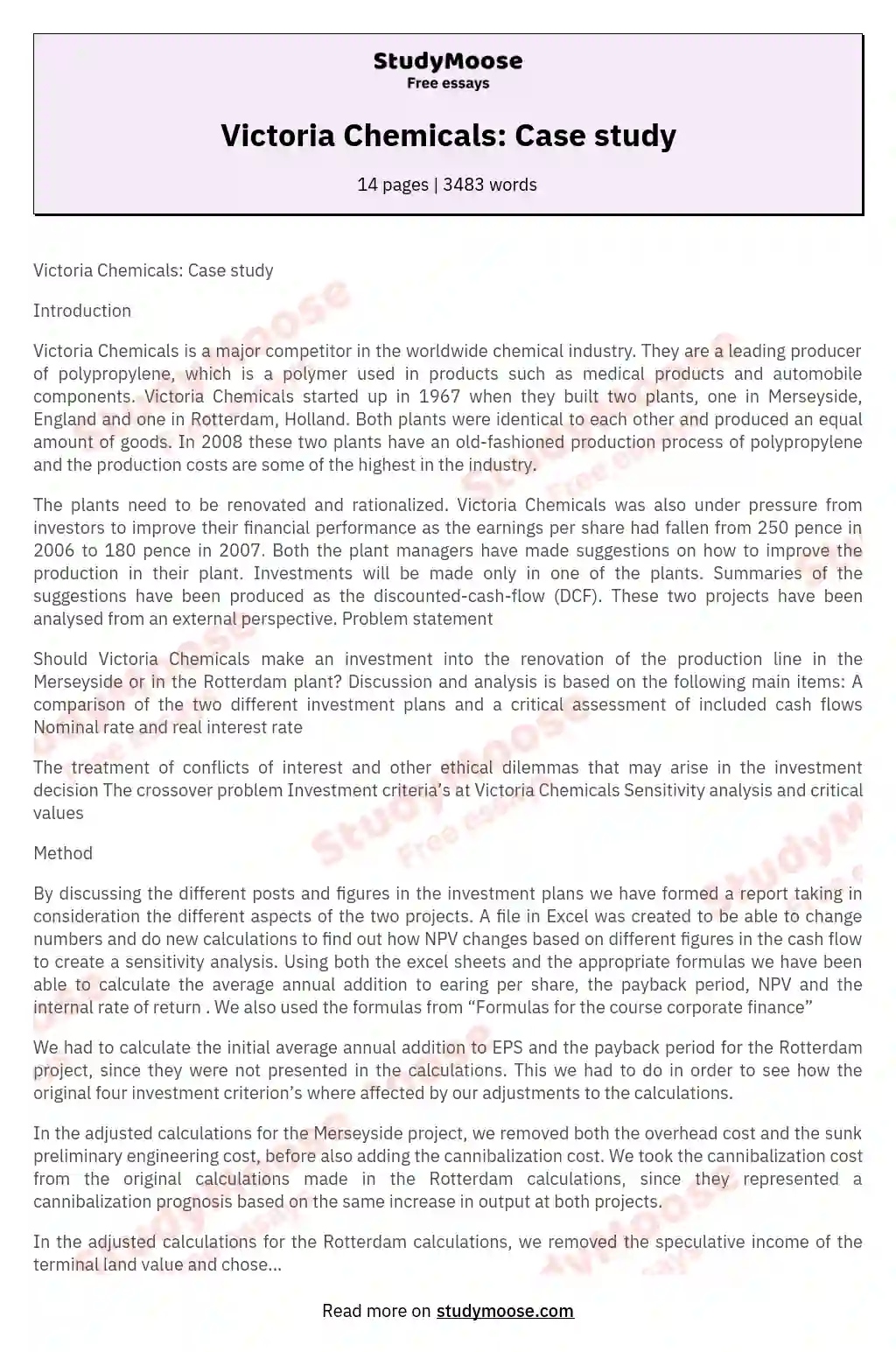Section 230 And Banned Chemicals: A Case Study Of EBay's Liability

Table of Contents
Understanding Section 230 and its Application to Online Marketplaces
Defining Section 230:
Section 230 of the Communications Decency Act of 1996 is a cornerstone of internet law in the United States. It shields online platforms from liability for user-generated content. This means websites and online service providers are generally not treated as publishers or speakers of information posted by their users. This protection is crucial for fostering free speech and innovation online.
Section 230 and eBay:
Section 230's application to online marketplaces like eBay is nuanced. eBay, as a platform hosting third-party sellers, relies heavily on this protection. However, the fact that these sellers are independent actors introduces complexities. eBay isn't directly responsible for the content created or products sold by its sellers, but its actions (or inactions) in moderating the platform can affect its legal standing.
-
The "good samaritan" provision of Section 230: This allows platforms to proactively moderate content and remove harmful material without losing their immunity. eBay utilizes this provision to remove listings violating its terms of service.
-
Limitations of Section 230: Section 230 doesn't offer blanket immunity. It doesn't protect platforms from liability if they are directly involved in creating illegal content or if they are found to have acted as publishers rather than distributors of content. This is where the sale of banned chemicals becomes problematic.
-
Challenged Cases: Numerous cases have challenged Section 230, often focusing on the platform's role in moderating content related to illegal activities, hate speech, or misinformation. These cases highlight the ongoing debate about the scope and limitations of this crucial legal protection.
The Sale of Banned Chemicals on eBay: A Legal Minefield
Identifying Prohibited Substances:
eBay, like other online marketplaces, prohibits the sale of various banned chemicals, including:
- Pesticides: Many pesticides are restricted or banned due to their harmful environmental and health effects. Regulations vary by jurisdiction, adding to the complexity.
- Controlled substances: Drugs and other substances regulated under federal and state laws are strictly prohibited from sale on eBay.
- Precursor chemicals: Substances used in the manufacture of illicit drugs are also often banned.
- Hazardous materials: Chemicals posing significant health or environmental risks are subject to strict regulations and often prohibited from sale without proper licensing and handling.
eBay's Policies and Enforcement:
eBay maintains clear policies prohibiting the sale of restricted items. These policies are regularly updated to reflect evolving regulations. Their enforcement relies on a multi-pronged approach:
- Proactive measures: eBay utilizes automated systems to scan listings for keywords and product descriptions associated with banned chemicals.
- Reactive measures: eBay relies on user reports and its own monitoring teams to identify and remove prohibited listings. Violations can result in account suspensions or permanent bans.
- Effectiveness analysis: The effectiveness of eBay's system is constantly debated. While they make efforts, the sheer volume of listings and the creativity of sellers in circumventing restrictions present an ongoing challenge.
eBay's Liability under Section 230: A Balancing Act
The "Knowledge" Requirement:
To lose Section 230 protection, a platform must have knowledge of specific illegal activity and substantially contribute to that activity. For eBay, this means demonstrating knowledge that a specific listing involves banned chemicals and actively facilitating the sale. Mere negligence or failure to detect every violation isn't sufficient to strip them of Section 230 immunity.
Direct vs. Indirect Liability:
eBay's liability hinges on this distinction. Direct liability arises if eBay actively participates in the sale of banned chemicals, perhaps through an intentional omission or active promotion. Indirect liability is harder to establish and would require demonstrating a pattern of negligence or willful blindness that substantially contributed to the sale of banned chemicals.
- Arguments for and against eBay's liability: Arguments against liability center on the scale of the platform and the impossibility of monitoring every listing. Arguments for liability emphasize eBay's knowledge of the problem, its resources to address it, and the potential harm caused by the sale of banned chemicals.
- Relevant case law: Case law on online platforms and the sale of illegal goods is evolving rapidly. Analyzing these precedents is essential to predicting the outcome of future cases involving eBay and similar platforms.
- User reports and platform monitoring: The effectiveness of eBay's monitoring and its response to user reports are crucial elements in determining liability. A demonstrable lack of response to known violations can weaken eBay's defense.
Implications for Sellers and Buyers
Risks for Sellers:
Sellers violating eBay's policies and relevant laws face severe consequences:
- Criminal charges: Depending on the type and quantity of banned chemicals, sellers could face criminal charges, including fines and imprisonment.
- Civil lawsuits: Buyers harmed by the use of banned chemicals could file civil lawsuits seeking damages.
Risks for Buyers:
Buyers purchasing banned chemicals risk serious harm:
- Health and safety risks: Exposure to banned chemicals can result in severe health problems.
- Legal ramifications: Possession of banned chemicals is often illegal, exposing buyers to potential legal consequences.
- Importance of buyer awareness: Buyers must exercise extreme caution and due diligence when purchasing chemicals online.
Conclusion:
The interaction between Section 230, online marketplaces, and the sale of banned chemicals is complex and dynamic. While Section 230 offers substantial protection to platforms like eBay, their obligation to monitor and regulate their platforms remains crucial. eBay's liability hinges on balancing the facilitation of a robust marketplace with preventing the sale of dangerous substances. Understanding the intricacies of Section 230 and its application to specific situations, such as the sale of banned chemicals on eBay, is vital for both online platforms and their users. Further investigation into Section 230 eBay liability is needed to navigate this ever-evolving legal environment. To learn more about safeguarding your business from legal risks associated with Section 230 eBay liability, seek advice from a legal expert specializing in e-commerce law.

Featured Posts
-
 A Guide To Vancouvers Immersive Banksy Experience
May 31, 2025
A Guide To Vancouvers Immersive Banksy Experience
May 31, 2025 -
 Sanofi Inaugure Un Nouveau Site En France Communique De Presse
May 31, 2025
Sanofi Inaugure Un Nouveau Site En France Communique De Presse
May 31, 2025 -
 The Good Life Prioritizing Values And Goals
May 31, 2025
The Good Life Prioritizing Values And Goals
May 31, 2025 -
 Police Launch Urgent Search For Missing 11 Year Old Girl In River Thames
May 31, 2025
Police Launch Urgent Search For Missing 11 Year Old Girl In River Thames
May 31, 2025 -
 Miley Cyrus Plagiaatzaak Rechtszaak Over Hit Gelijkend Op Bruno Mars Song Gaat Door
May 31, 2025
Miley Cyrus Plagiaatzaak Rechtszaak Over Hit Gelijkend Op Bruno Mars Song Gaat Door
May 31, 2025
